Luke Evans on his journey from Jehovah’s Witness to Hollywood’s first gay action star
Luke Evans speaks with GAY TIMES about his Jehovah’s Witness upbringing, memoir and paving the way for LGBTQIA+ representation in Hollywood. WORDS BY SAM DAMSHENAS PHOTOGRAPHY BY PATSY O’NEILL “My story… The post Luke Evans on his journey from Jehovah’s Witness to Hollywood’s first gay action star appeared first on GAY TIMES.

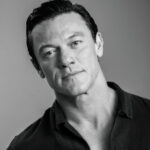
Luke Evans speaks with GAY TIMES about his Jehovah’s Witness upbringing, memoir and paving the way for LGBTQIA+ representation in Hollywood.
WORDS BY SAM DAMSHENAS
PHOTOGRAPHY BY PATSY O’NEILL

“My story is, I hope, one of hope and inspiration—reminding others to keep going and believe that something better is possible,” says Luke Evans. The Welsh actor has just released his memoir, Boy from the Valleys: My Unexpected Journey, an intimate account of how he reconciled his sexuality with his Jehovah’s Witness upbringing, eventually leaving the faith, and ultimately becoming the world’s first openly gay action star. Evans shares with GAY TIMES that he “wasn’t expecting” such an “unbelievable” reaction to his memoir from readers who have experienced similar trauma. “My DMs have been flooded with beautiful, painful, heartwarming, and inspiring messages from people all over the world—many of whom have gone through something similar, haven’t come out, or live in countries where they can’t be their true selves,” he says. “I’ve kind of given them a voice.”
Evans’s journey from self-discovery to Hollywood trailblazer has also defied expectations within the industry. Since his breakout role as Zeus in Immortals (2011), Evans has shattered boundaries for an openly gay actor in a “straight-dominated industry,” taking on a series of iconic, macho roles—from Owen Shaw in the Fast & Furious franchise (2013-2017) and Bard the Bowman in The Hobbit trilogy (2012-2014) to Disney’s egomaniacal (hunk) Gaston in Beauty and the Beast (2017). “It was clear to everyone that I, a gay man, was playing these big action characters, straight masculine characters,” he explains, “and everyone just seemed to get on with it and not care, which felt great.”
Following the release of Boy from the Valleys, Evans expands on the themes of identity and representation that run throughout his memoir. He reflects on how a groundbreaking queer production helped pave the way for his hetero-hero status, and shares his experience of representing the LGBTQIA+ community with back-to-back queer films, Our Son and Good Grief (2023). Evans also discusses his relationship with his father, a “minor royal,” and jokes about the possibility of his dad winning an Academy Award before he does.
Luke, after reading your book, I couldn’t help but wonder if you and Fran have gotten a dog yet. I even Googled ‘Luke Evans dog’ and found a man with the same name who apparently has thirty of them. I thought, ‘Blimey, he moved quick!’
That’s hilarious. No, we don’t have a dog, but it’s very funny that you talk about that right this minute because we are thinking about getting a dog, very seriously.
Any specific breed you have your eye on?
It has to be small enough to fly with us in the cabin because we travel a lot. It’s going to be a flying dog! We do love dachshunds a lot. In our friendship circle, there are five. We’ve been around them for many years, so we know this breed very well, and they’re full of character; busy, specific, expressive, and small enough to travel with.
Congratulations on the book—it’s incredibly insightful to learn about your upbringing as a Jehovah’s Witness. How has the response been from LGBTQ+ individuals who have gone through similar experiences?
I wasn’t expecting it. It’s been unbelievable. My DMs have been crazy, receiving really beautiful, painful, heartwarming and inspiring messages from people all over the world; people who have been through something similar, who haven’t come out or are in a country where they can’t be themselves. I’ve sort of given them a voice. There was one I read the other day that said, ‘You’ve made me realise I have something to live for, and that this is only temporary,’ which are the words I used to tell myself as a kid. ‘This is only temporary, my life will start at some point.’ I’ve shed a couple tears over the messages I’ve read, which is lovely.
It must be incredibly rewarding to receive such a response, especially after revisiting some deeply traumatic memories in your memoir?
Yeah, I don’t really revisit that place much because it wasn’t a pleasant, happy experience to go through for so many years. But, going back as the person I am now, I’m very happy and comfortable in my skin, it was like, ‘Wow, you achieved a lot and survived it.’ Sometimes I wonder how I did get through it, how I managed to not get damaged by it. That kind of constant bullying for years can really fuck you up as an adult. My story is, hopefully, a story of hope and inspiration, to keep going and knowing there is something better. That’s what I remember most, that there were people like me and I just needed to find them. I had to be able to find them and live a happy life.
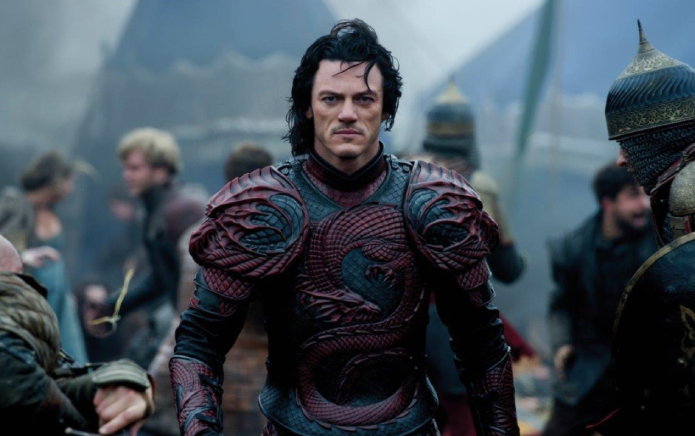
Luke Evans in Dracula: Untold (2014)
You explained that you still feel “burned” by your experience with religion. If it’s okay, do you mind expanding on that?
Well, “burned” because my experience of religion is not very nice. The religion that I was part of tried to, well did, cut me off and tried to force my mum and dad to cut me off. That’s not love. That’s not kindness. That’s not understanding, and all the things you think religion is about. Because of that, I have no belief. I don’t believe in God. I don’t believe there is an afterlife. I don’t believe there is a hell. I believe we’re an energy and we have purpose when we’re alive on this planet to do something good and to live our lives the happiest way we can, and to do the best we can. That’s what I meant when I said “burned”, for sure. I don’t have anger, though. I’m not angry, weirdly, and I wasn’t even angry back then. As soon as I moved out of home, got a job and started to meet people that weren’t Jehovah’s Witnesses, it was just like, ‘Okay, that’s done. But now, I’m not going to lick my wounds. I’m going to let them heal and get on with this whole new world that I’ve become part of, a world I’ve been told my whole life was bad and dangerous, that they’re all going to die at Armageddon and that gay people are bad.’ None of that was true. I was fortunate that, when I was 16, I met a lot of lovely people when I left home. They’re still in my life, which is an incredible thing.
There is a lot of love [in religion], and my mum and dad have a very loving existence within their congregation and their friends, and it’s lovely to see. I couldn’t be happier that it’s worked for them in a beautiful way. I also have a lot of friends that have religious beliefs, or they’re connected to religion in some form or other, and they’re happy about it. I think, as gay people, we have to accept so much, and we just want to be accepted. I mean, that’s how I’ve looked at my life. I’m not pushing anything on you, I just want to be myself and I’m not forcing anybody to anything more than just let me exist. I think that’s why gay people are so open to accepting anyone, because we are a minority and we’ve been treated badly. We’ve never had equality in the real sense of the world, and it’s given me this wonderful sense of understanding and acceptance of everyone.
It was truly heartwarming to hear about your journey with your parents—from your dad’s initial, visceral reaction to your sexuality, to him eventually becoming an unexpected breakout star in The Hobbit. How did their relationship with their faith evolve after you came out?
My mum and dad’s relationship to their religion is very deep and personal. Their relationship is with their God, and it’s very much them and their God. Throughout my life I’ve introduced them to many kinds of people who are not Jehovah’s Witnesses and they’ve had their eyes opened, which they never would have had if it wasn’t for the fact that I left the religion and pursued a very different journey in my life. Because of that, my parents are very open-minded and accept and respect people for who they are. My parents don’t think they’re better than anyone else because they’re the ones who are going to be saved at Armageddon, which is what they believe. It’s painful for them to accept their son won’t live through Armageddon and many of their friends, including the baker at the top of the street who’s been there for 45 years that my mum visits everyday. It’s quite unusual what my mum and dad have done, and they definitely had backlash from the religion because of it, but they found a way around it. It’s not easy for them. But, everybody absolutely loves my parents. They’re the kindest and most open, welcoming, curious, happy people. That’s nothing to do with their religion, that’s just who they are. They are good people.
Has your dad been an extra on any of your projects since The Hobbit?
What was the last thing my dad was in, Fran? Fran’s having breakfast in the background.
Fran: He always goes to your events. I mean, last year in the West End, he was outside.
Last year when I did a show in the West End, my dad was outside doing selfies with fans the whole time. In fact, I did a signing in Covent Garden recently and there was like three hundred people outside, and my dad kept them company all night. He felt like a minor royal walking down the queue, but he was! They all know who he is, which he finds bizarre, but he clearly loves it. I’ve got the most amazing fans, by the way. They don’t just love me, they love everyone. I get presents for my mother sent here to the house and I’m like, ‘Where’s my present?’ They’re both immensely proud of what I’ve achieved, but also who I am. That’s the real bit, they’re proud of who I am as a human being and what I do for other people. It’s not just about the fact I make Hollywood movies, blah, blah, blah. It’s how I live my life. I try to be kind and authentic and good.
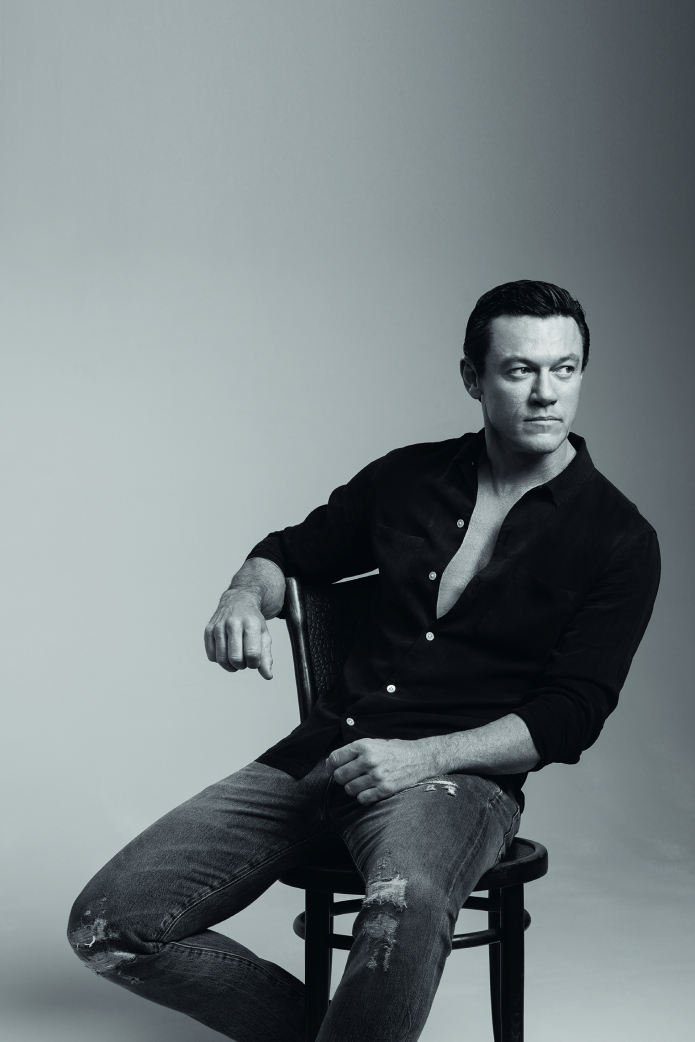
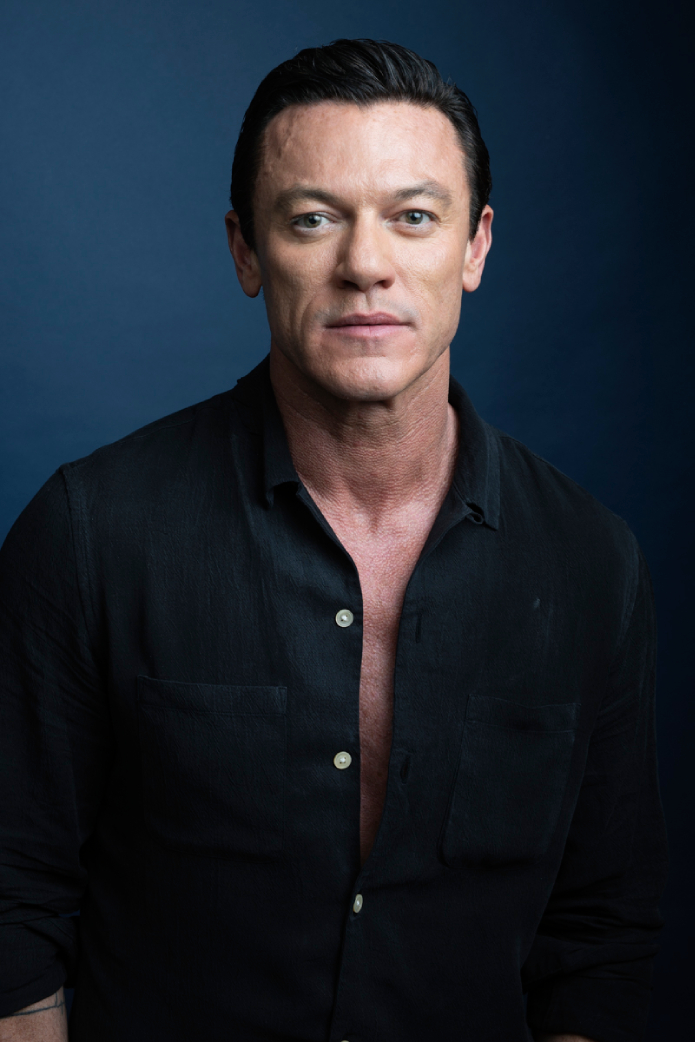
Imagine your dad gets an Oscar before you do?
That’ll be the end of the relationship. We won’t be speaking after that.
I’d like to shift gears and discuss your career, as it’s fascinating how your success in iconic, traditionally ‘straight’ macho roles can be traced back to a legendary queer production, Rent, or rather, Rent Remixed. That production ultimately led to recognition from Duncan Millership, followed by Small Change and William Morris…
Yeah, crazy, no? I was playing Roger in Rent and… It’s a mad, mad story. This musical, I decided it was going to be my last. I was done. I was like, ‘I can’t survive. I need to look further than next month, financially.’ I needed stability. So, it’s mad that was where the ball started to roll, and thank god Duncan reached out. He’s my friend now. He’s got a husband and two children in LA, we all hang out and it’s gorgeous. That’s the other thing, keeping people in your life that really matter, making an effort to cultivate long friendships. I love the fact that he’s been in my life for 16 years.
I know you have quite thick skin, but it was infuriating, yet not surprising, to discover how obsessed the media was with your sexuality.
What made me think is how people will just believe what they read without contextualising it or knowing enough about me or my journey. I mean, of course, no one knew my journey but I had been in London for 10 years; [working] on the door of Shadow Lounge, the VIP host every night, I was everywhere and happy. Then of all a sudden this new business started for me where I was on a different platform, and everyone thought I was in the closet. I was told, and rightly so, that you just don’t respond to it otherwise you open up a massive can of worms and will have to keep explaining yourself. So, I had to stay quiet but it was painful to watch how people thought that I completely disowned who I was. I was sitting at home reading this with my boyfriend at the time, and it was super painful. Some friends I knew, without knowing the story, were a little… attacking. I had to say, ‘Hold on a minute, no, no, no. None of this was said by me, it was fabricated by tabloids.’ But, the weird thing is that it all just went away because, at the point where I was able to talk about it, it was because of a really interesting question an interviewer asked me: ‘How does it feel to be the world’s first openly gay action hero?’ I was like, ‘Is that what people think?’ And he was like, ‘Yeah. Think about it, is there anyone else?’ I said, ‘I know full well there is no one else because I don’t have anyone I can talk to about it. If the message is that I’m here doing these roles, I’m living the life the way that I want to live it and I’m happy, then great, I’ll take that title and live with it very happily.’
Was that interview the first time you realised how monumental and trailblazing it was, and is, for an openly gay actor to be cast in these macho roles?
Yeah, it was. It was a very reputable New York journalist. I remember it so clearly and I think, from that moment, it dawned on me the place that I was standing in and the position I held within this very straight-dominated industry. But, it wasn’t like I could not be that person. That’s who I was, and everyone knew it. As the years went by, I did worry that it was going to stop my jobs. I thought, ‘Oh fuck, maybe now it’s out the jobs will stop coming,’ which is a terrible thing to have to think. It was like, ‘There’s nothing I can do about this. What can I do that wouldn’t be painful? And dishonouring who I was?’ So, I just thought, ‘Whatever comes comes, but at least I’m open and happy.’ But, the jobs didn’t stop. I hope that means when I was getting cast that my sexuality didn’t have anything to do with it. It was the fact that he played Bard the Bowman, Dracula, Owen Shaw. It was clear to everyone that I, a gay man, was playing these big action characters, straight masculine characters, and everyone just seemed to get on with it and not care, which felt great. It was a lovely thing.
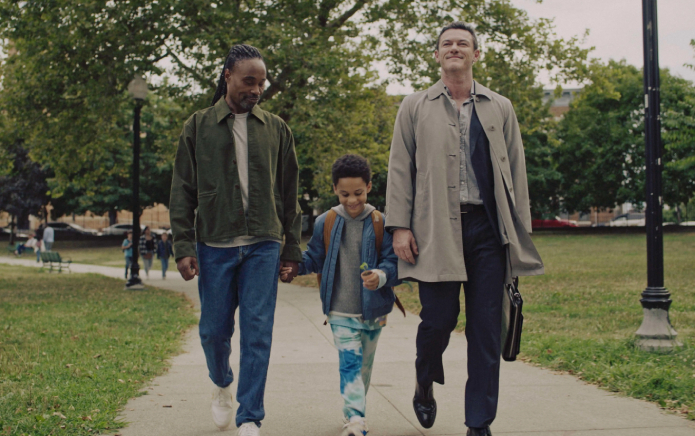
Billy Porter and Luke Evans in Our Son (2023)
It’s incredible to witness the impact you’ve had with those roles. While there are still not enough openly gay actors in the industry, it’s inspiring to see stars like Colman Domingo and Jonathan Bailey taking on straight characters—and even action heroes. How does it feel to see that progress and know you’ve helped pave the way?”
If it is me who has paved the way, then what an honour. Yeah, what a lovely thing. They’re proud of it, they’re happy and working and doing the jobs. Now, people don’t first see sexuality. They see talent. They see an actor, a face, a person who has the ability and sexuality doesn’t come into it. It’s wonderful. I always say that it won’t be perfect until it’s not a topic that anybody wants to talk about, when nobody mentions it. That’s not because we’re avoiding it, just that it’s not a thing. We’re far from there, sadly. I don’t think we will be there for a very long time, but the wheels are moving in the right direction. But, it’s scary; different governments, different policies, different religions, there’s a lot against us around the world. And so I feel I do have a responsibility in my position and who I am in the public world to represent who I am and not shy away from it. This book is basically the biggest flag I’ll ever wave, and I’m very glad I did it. I hope it helps people, that people are inspired by it. If I help just one person, I’ll be very happy.
You’ve recently begun exploring queer roles, most notably in Our Son and Good Grief, both of which were groundbreaking for their portrayal of themes like queer divorce and mourning. How did it feel to portray characters that resonated more closely with your own identity, compared to roles like Dracula or Owen Shaw?
It was just wonderful. I’ve been looking for those roles for ages, by the way, and they all seemed to happen in one year. It wasn’t like, ‘Okay, 2024 is the gay year for me!’ No. It was just about looking for the right script with the right role, the character I could relate to and play authentically. Nicky, the character in Our Son, I just understood him so deeply. It was a lovely thing to play a gay man in that world, in that story. There was a real depth to my understanding of him and relationships. I mean, I don’t have a kid but the pain of when a relationship breaks up… I know that feeling, and it’s horrendous. Of course, when Good Grief came along and Dan [Levy] asked me if I could play his husband for ten minutes I was like, ‘Absolutely!’ It was a glorious, glorious experience. I loved that character. I wish he was in the film for longer, but we did have a beautiful start to the story.
Thank you so much for chatting with me today, Luke. I’m very excited for your next film with Milla Jojovich, so hopefully next time we talk it’ll be less about gay shit and trauma and more-so about… sci-fi?
Alright, no more “gay shit!” It was lovely to chat with you, Sam.
Luke Evans’ memoir, Boy from the Valleys: My Unexpected Journey, is out now.
The post Luke Evans on his journey from Jehovah’s Witness to Hollywood’s first gay action star appeared first on GAY TIMES.

 Mark
Mark 





